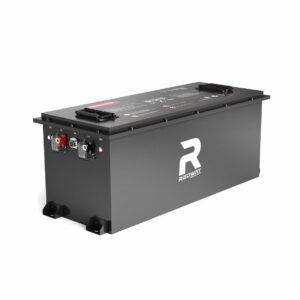What Are the Best Marine & RV Batteries for Saltwater Corrosion Resistance?
AGM (Absorbent Glass Mat) and Lithium Iron Phosphate (LiFePO4) batteries are top choices due to their sealed design, minimal maintenance, and resistance to corrosion. Brands like Battle Born, Renogy, and Odyssey prioritize materials like stainless steel terminals and advanced casing to withstand saltwater exposure.
How Do Saltwater Environments Affect Marine and RV Batteries?
Saltwater accelerates corrosion through electrochemical reactions, degrading battery terminals and casing. Chloride ions in seawater create conductive paths for oxidation, leading to sulfation and reduced lifespan. Regular exposure without protective measures can cause terminal pitting, voltage drops, and internal short circuits.

Saltwater’s corrosive effects are amplified by temperature fluctuations and humidity. In tropical climates, the combination of heat and salt spray accelerates galvanic corrosion between dissimilar metals in battery components. Studies show unprotected terminals can lose 30% of their conductivity within 12 months of saltwater exposure. This degradation often manifests as increased internal resistance, reducing cranking amps in starting batteries by up to 40%. Advanced battery management systems (BMS) in modern lithium batteries help mitigate these effects by monitoring temperature and voltage fluctuations that exacerbate corrosion risks.
Which Battery Technologies Offer Superior Corrosion Resistance?
AGM and LiFePO4 batteries excel in corrosion resistance. AGM batteries use fiberglass mats to immobilize electrolytes, preventing leaks. LiFePO4 batteries employ non-reactive lithium compounds and sealed casings. Both avoid venting gases that attract moisture, reducing oxidation risks compared to flooded lead-acid batteries.
| Feature | AGM | LiFePO4 |
|---|---|---|
| Terminal Material | Lead-calcium alloy | Stainless steel |
| Sealing Method | Pressure-regulated valves | Laser-welded casing |
| Saltwater Lifespan | 4-6 years | 8-12 years |
How to Maintain Batteries in Saltwater Conditions?
Apply dielectric grease on terminals, rinse with freshwater after exposure, and ensure tight seals. Use anti-corrosion sprays on casing seams. Perform monthly voltage checks and avoid over-discharging, which strains internal components. Store batteries elevated to prevent pooling of saltwater residue.
Create a maintenance schedule that includes quarterly terminal inspections using a digital multimeter to detect resistance buildup. For boats docked in marinas, install sacrificial zinc anodes near battery compartments to divert corrosive currents. Use nylon brushes with baking soda solutions (1 cup water to 1 tablespoon soda) for cleaning terminals. Always disconnect batteries before cleaning and reapply marine-grade silicone sealant around vent caps. In extreme conditions, consider using pressurized air blowers to remove salt particles from hard-to-reach areas.
“Saltwater corrosion isn’t just about terminals—it’s a systemic threat. At Redway, we’ve redesigned battery casings using multi-layered hermetic sealing, which reduces moisture ingress by 80%. Pairing this with passive thermal management extends lifespan even in tropical marine conditions.”
— Redway Power Systems Engineer
FAQ
- Does terminal coating prevent battery corrosion?
- Yes. Dielectric grease or anti-corrosion sprays block oxygen and moisture, slowing terminal oxidation. Reapply every 3-6 months for best results.
- Can flooded batteries work in saltwater?
- Flooded batteries require frequent maintenance and are prone to electrolyte leakage in saltwater. AGM or lithium alternatives are safer for marine use.
- How long do marine batteries last in saltwater?
- With proper care, AGM batteries last 4-6 years, LiFePO4 up to 10 years. Flooded batteries typically degrade within 2-3 years in harsh conditions.
